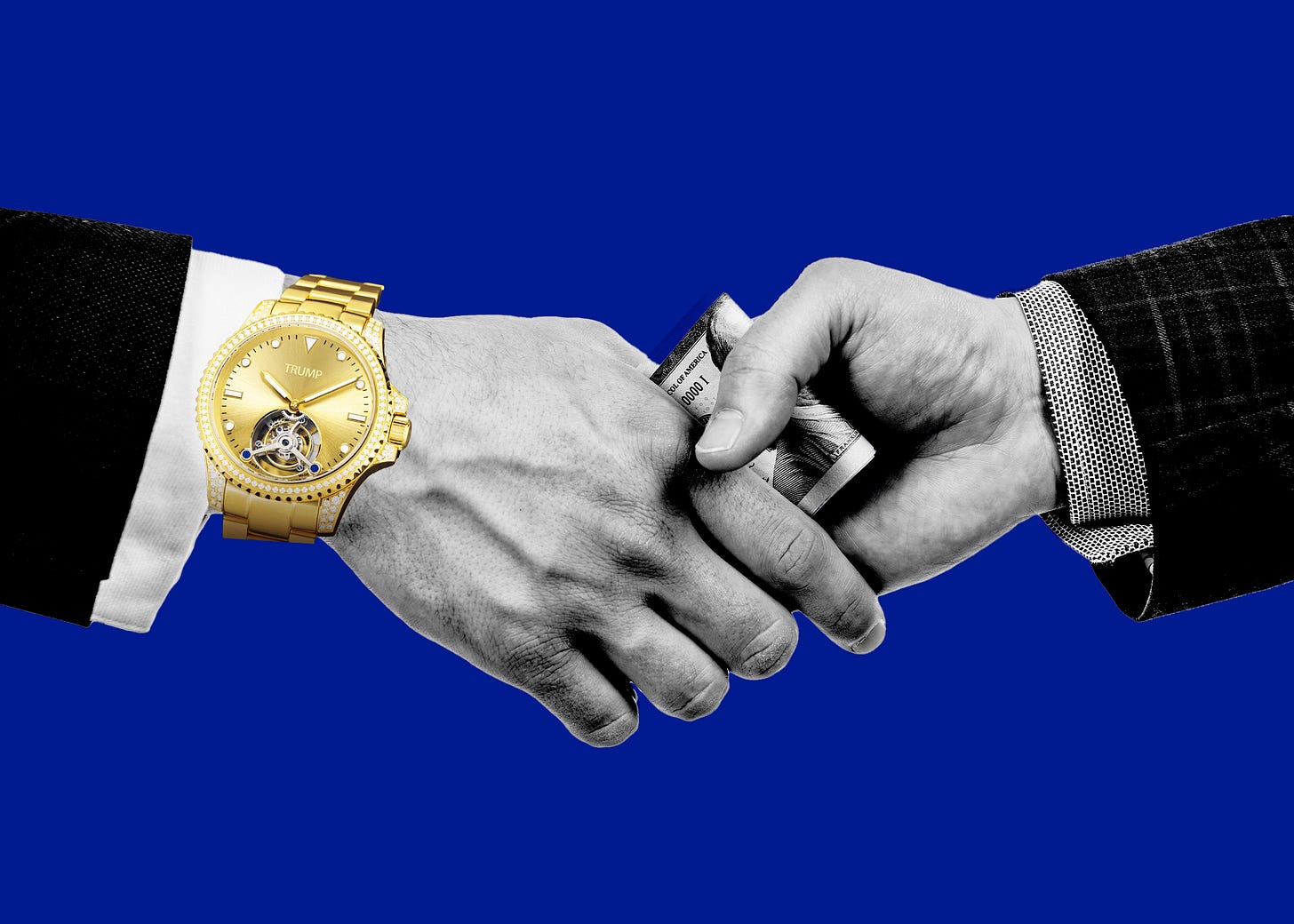Trump, Magic Beans, and the $100,000 Watch
Trump’s watch scheme is an arrangement specifically designed to defeat bribery laws.
Before we start: A reader with deep connections to Asheville sent me a note about a friend who is working to get meals to people from a food hub. They have a GoFundMe and if you can help out, I know they’d appreciate it.
1. Crime
Let’s say you are an unscrupulous politician who wants to monetize your power. You might attempt the following:
You have goods/services you can offer. When you’re in office, you have the power of choosing vendors for government contracts, nominating people to important posts in government, and/or signing/vetoing/voting for legislation.
These are valuable fucking things that you don’t have to give away for nothing.1
An individual who places value on these actions can offer you money for them. Depending on your circumstances, maybe that money is offered in the form of donations to your campaign. Or maybe it’s bars of gold given to you personally. Or something else.
There’s a satisfying simplicity to such arrangements: Both parties agree to the terms, the transaction is explicit. The only problem is that sometimes these arrangements end with the politician in jail.
Not always! Because the legal distinction between “ordinary politics” and “bribery” is less clear than you might think.
Even so, most politicians want to avoid prison, so they will sometimes employ less straightforward, more exotic, mechanisms. Here is another way a politician can monetize his power:
The politician publicly sells some valueless good—let’s say, magic beans—at a wildly inflated price. Say, $100,000.
Very few people would pay $100,000 for magic beans.
But an individual who wants to influence the politician might buy lots of them. This individual might say something like, “Yes, I will take $1,000,000 worth of your magic beans.”
The politician takes the money and winks. It would be implicitly understood that the politician owes this individual an unspecified favor in the indeterminate future.
I am not a lawyer and this is not legal advice, but this arrangement is probably not illegal.
You can see the logistical problems with this arrangement. It is complicated and the implied contract has been abstracted. The briber doesn’t always get the chance to say explicitly beforehand, “I will buy $1 million of magic beans and then at a later date, you will do X for me” and confirm an agreement from the politician. And the more abstract the exchange is, the harder it is for both parties to be satisfied.
But that’s the tradeoff for mitigating criminal exposure.
If the politician wanted to further insulate himself, he could add a couple of wrinkles to the scheme.
He could sell the magic beans during his campaign—meaning before he got elected to office.
He could run the magic-bean sale through a third party.
How might this third-party arrangement work?
While out of office, the politician licenses his name, image, and likeness to a vendor who markets and sells the beans.
The terms of the license could stipulate that the candidate gets 90 percent of all gross receipts.
The third party is then the one making the beans and taking money from the “customers.”
The politician is only a pitchman who happens to be collecting money on the back end—and, crucially, this money is bundled, so he could plausibly say that he does not know who bought the beans.
Again, not a lawyer and not legal advice—but this all seems legal.
Actually, I’d go further: This seems like a clever arrangement specifically designed to defeat bribery laws.
2. Trump Watches, Redux
We talked about the Trump Watch last week and because I am a lunkhead I focused on the horology and economics.
I didn’t even consider the question of whether or not the Trump Watches had the potential to run afoul of bribery laws.



